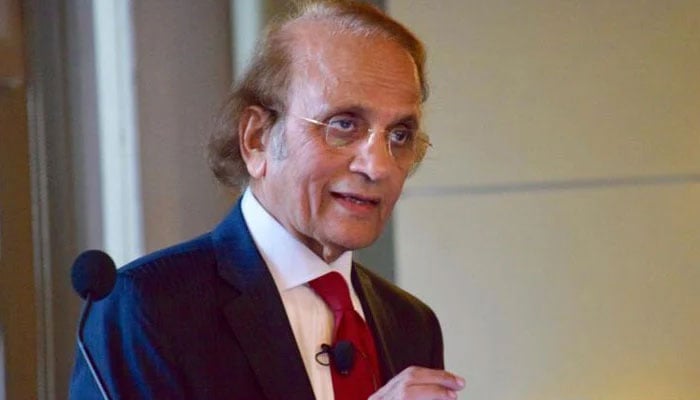Commission inquiry
The judges have also asked the SJC to guide them on how to deal with such interference
Former chief justice of Pakistan Justice (r) Tassaduq Hussain Jillani has a tough task ahead: as head of the newly-approved inquiry commission over allegations by six judges of the Islamabad High Court (IHC), former Justice Jillani will be looking into the recent allegations levelled by the judges in a letter. The commission’s TORs have also been issued. The main task for the commission is to investigate the allegations and see how they hold up to scrutiny and also see whether any official was directly involved in the alleged interference and then also determine what kind of action should be taken once the investigation has figured out the details.
On March 26, six judges of the IHC had in a letter asked the Supreme Judicial Council (SJC) to convene a judicial convention over what they allege is interference by members of the executive, including intelligence agencies, in judicial affairs. The judges have also asked the SJC to guide them on how to deal with such interference. The letter comes days after the Supreme Court’s verdict in the Justice Shaukat Siddiqui case in which the apex court ruled that Justice Siddiqui’s removal from his position was illegal. On March 18, Chief Justice of Pakistan Qazi Faez Isa met with Prime Minister Shehbaz Sharif, discussed the situation, and said that such meddling in the judicial workings of judges would not be tolerated.
The task in front of the commission is important – and tough. Judicial independence is a fundamental pillar of democracy and any attempt to undermine judicial independence not only threatens the integrity of the judiciary but also erodes public trust in the justice system. The IHC judges’ letter raises serious questions about the extent of executive influence over the judiciary in Pakistan, including the appointment of judges and the handling of sensitive cases. Such interference, if proven true, would be a grave violation of the principles of judicial independence and the separation of powers. To uphold judicial independence in Pakistan, it is imperative that the government and state institutions respect the autonomy of the judiciary and refrain from any actions that may be perceived as attempts to influence judicial decisions. The judiciary, on its part, must also uphold the highest standards of integrity, transparency, and accountability. For a country that is already struggling with its faith in the justice system, the IHC judges’ letter comes as a further blow to judicial credibility. This is why the matter has to be investigated keeping in mind the utmost transparency. One of the more stringent reactions to the commission has been that ideally, the judiciary should be the one leading the investigation, and not the government. This is why it is now doubly important for civil society to remain vigilant and ensure that the principles of democracy and rule of law are upheld. Such letters in any other country would have shaken the whole system. Dare we hope there is at least some reckoning for interventions in our land as well?
-
 Detective Chief Inspector Reveals How Andrew Got Treated In Police Custody
Detective Chief Inspector Reveals How Andrew Got Treated In Police Custody -
 Gemini 3.1 Pro Unveiled: Google’s Next-gen AI For Advanced Reasoning & Faster Enterprise Workflows
Gemini 3.1 Pro Unveiled: Google’s Next-gen AI For Advanced Reasoning & Faster Enterprise Workflows -
 Oprah Winfrey Talks About Weight-loss 'tool To Manage' Health
Oprah Winfrey Talks About Weight-loss 'tool To Manage' Health -
 Texas Emerges As World's Future Data Center Capital
Texas Emerges As World's Future Data Center Capital -
 South Korea’s Ex-President Yoon Issues Public Apology After Being Sentenced To Life Over Martial Law
South Korea’s Ex-President Yoon Issues Public Apology After Being Sentenced To Life Over Martial Law -
 Eric Dane Recorded Episodes For The Third Season Of 'Euphoria' Before His Death From ALS Complications
Eric Dane Recorded Episodes For The Third Season Of 'Euphoria' Before His Death From ALS Complications -
 Inside Morning Of Andrew’s Arrest And How He Responded: ‘Do You Know Who I Am?’
Inside Morning Of Andrew’s Arrest And How He Responded: ‘Do You Know Who I Am?’ -
 OpenAI Sam Altman Predicts AI Superintelligence By 2028: Is Humanity Ready For A Turning Point?
OpenAI Sam Altman Predicts AI Superintelligence By 2028: Is Humanity Ready For A Turning Point? -
 WhatsApp Rolls Out Group Message History To Ease Group Chats
WhatsApp Rolls Out Group Message History To Ease Group Chats -
 Tesla Expands Cybertruck Lineup With Affordable Model In US, Slashes Cyberbeast Price To Boost Demand
Tesla Expands Cybertruck Lineup With Affordable Model In US, Slashes Cyberbeast Price To Boost Demand -
 AI Is Not As Powerful As We Think, Says Mathematician Hannah Fry
AI Is Not As Powerful As We Think, Says Mathematician Hannah Fry -
 How Andrew's Feeling Since His Arrest & Subsequent Release Amid Tech & Computers Seize
How Andrew's Feeling Since His Arrest & Subsequent Release Amid Tech & Computers Seize -
 Trump Officially Directs US Agencies To Identify And Release Files On Extraterrestrial Life
Trump Officially Directs US Agencies To Identify And Release Files On Extraterrestrial Life -
 2026 Winter Olympics: Alysa Liu Claims Gold, Snapping 20-year Drought For US Figure Skating
2026 Winter Olympics: Alysa Liu Claims Gold, Snapping 20-year Drought For US Figure Skating -
 Hilary Duff Opens Up About Marriage Fears Despite Strong Bond With Matthew Koma
Hilary Duff Opens Up About Marriage Fears Despite Strong Bond With Matthew Koma -
 ‘Grey’s Anatomy’ Star Eric Dane Breathes His Last At 53
‘Grey’s Anatomy’ Star Eric Dane Breathes His Last At 53




